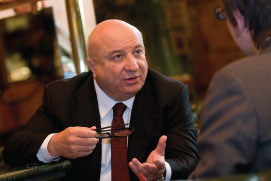
Sener: “The strategy is always to be in emerging markets where there is significant room for growth. We are seeking airports in markets where there is scope for substantial development and growth.”
TAV Airports is a prime example of the success being enjoyed in the dynamic Turkish market. Given its status as an emerging economy, Turkey’s proximity to other key markets is a major contributing factor in its potential for continued growth. In 2008, when much of the world and certainly most of Europe, was seeing declining figures, Turkey saw an 8% increase in air passenger traffic. That same year, growth of almost 20% was recorded across the TAV portfolio of airports. That success has continued.
TAV saw 13% passenger growth in the first half of 2010 on the top of 3% growth in 2009, while European passenger traffic increased 6% in the first half of 2010 and contracted by 3% in 2009. When TAV undertook operations at Istanbul Atatu?rk Airport, passengers numbered only 9.5 million. In 2009, Istanbul Atatu?rk’s throughout was around 30 million. Today, TAV has become a global brand name around the world in the aviation sector.
“The consolidated revenue of our company increased well above passenger growth by 25% – rising to €351 million in the first half of 2010 – by launching new operations and investments. Behind these successes there is a huge ‘family’ consisting of 33,000 members who have been devoted to their work for 10 years,” explained Sener. “The reasons for this growth are that we are in an emerging market with a population of 72 million and a large young population. Turkey is also a popular and competitive tourist destination. Finally, Turkish banks are heavily regulated, which helped us weather the financial crisis,” explained Sener.
Another contributing factor is the growth of Turkish Airlines. There are clear synergies between TAV Airports and the airline – the frequencies of the airline are increasing to the airports operated by TAV. Turkish Airlines joined the Star Alliance in 2008, which has also been beneficial.
Sener advocates a partnership approach to the airport-airline relationship. “Airports and airlines are complementary,” he said. “Airlines are not our customers. They are our partners. Passengers are customers of both the airport and airline. We work together with Turkish Airlines and our national authorities. We have even implemented Collaborative Decision Making with them.”
Beyond Turkey
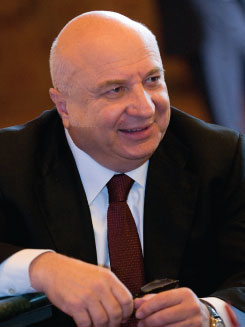
Sener: “Our main goal is to be a global company financially and a regional company operationally. Tradition is very important, as airports are the gateways into their countries.”
Indeed, this partnership approach was borne out in June, when TAV Airports signed a Memorandum of Understanding with Latvian national carrier airBaltic as a Joint Venture partner on a 50:50 shareholding basis for the development, construction and operation of a new passenger terminal at Riga International Airport. Sener commented that the airport “has been experiencing a continuous growth in passenger numbers throughout the second part of the decade and airBaltic is the focal point of that growth.”
TAV Airports has accomplished a significant amount in its first 10 years and has, to date, pursued an aggressive growth strategy. TAV Airports was founded as a joint venture between two construction groups – Tepe and Akfen – in 1997, when it won the Build-Operate-Transfer (BOT) bid for the Istanbul Atatürk Airport International Terminal. In line with its growth goals, TAV Airports restructured in 2006, organising its activities as ‘operations’ and ‘construction’ under TAV Airports and TAV Construction, respectively. TAV Airports Holding went public in February 2007 after this restructuring.
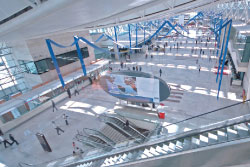
In recent months, both Istanbul Atatürk and Ankara Esenboga (pictured) have become Airport Carbon Accredited. Sener: “We are aware of our social responsibilities; we attach great importance to environmental issues. We are doing a lot of work to reduce emissions and are demonstrating this to passengers, as sustainable growth is very important.”
The story of TAV starts with the privatisation programme of airports through the Turkish Ministry of Transport. Its expanding airport portfolio began with Istanbul Atatürk Airport, which opened in January 2000. The BOT agreement was complete in 2005; following a new tender TAV Airports was awarded the tender for 15-and-a-half years from mid-2005. Its scope also grew to include the operation of the Domestic Terminal and the General Aviation Terminal. Sener highlighted the importance of Istanbul’s geographical location, describing it as at a “crossroads” where East meets West. Istanbul is in a critical geographical position at the intersection of three continents – TAV Airports’ aim is the development of new routes and to position Istanbul Atatürk as a prominent international hub. A €36 million programme of modernisation and expansion is currently underway.
TAV Airports also operates Ankara Esenboga Airport and the Izmir Adnan Menderes Airport International Terminal. In Georgia, it operates Tbilisi and Batumi International airports, while it has also expanded into the Balkans via Macedonia, where it operates Skopje and Ohrid airports. Operating in Skopje, the capital of Macedonia, a candidate country for accession to the EU – which has 500-year-old historic ties with Turkey – is a significant step for TAV Airports.
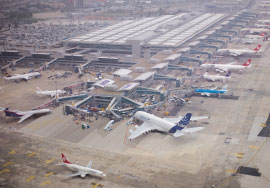
TAV saw 13% passenger growth in the first half of 2010 on the top of 3% growth in 2009, while European passenger traffic increased 6% in the first half of 2010 and contracted by 3% in 2009.
The Tunisian airports of Monastir and Enfidha give TAV Airports a strong North African presence. The new Enfidha International Airport opened in October 2009 and will be operated by TAV Tunisie until May 2047, predominantly serving tourism traffic. “We invested around €500 million. To operate a Greenfield airport, in the first year you need significant marketing resources – we have been introducing Enfidha airport to our customers. It’s one of the best airports in Africa,” explained Sener.
TAV Airports also opened the new low-cost airport Antalya Gazipasa last June. It won the bid to operate the airport in August 2007 and it has been leased to TAV Airports for 25 years. The airport is located in an important tourist region and TAV Airports is working in partnership with the Turkish authorities to attract low-cost and charter traffic. Sener explained that 25,000 families from Northern Europe live in the region and described the facility as a “boutique airport”. Antalya Gazipasa has an annual capacity of 500,000 passengers and a terminal area of 2,144sqm.
Ambitious Traffic Targets
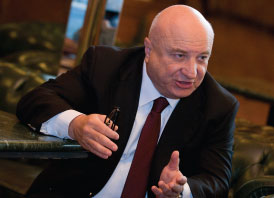
Sener advocates a partnership approach to the airport-airline relationship. “Airports and airlines are complementary of each other. Airlines are not our customers, they’re our partners, and passengers are customers of both the airport and airline.”
TAV Airports currently handles 42 million passengers per year across its airports. Organic growth will see TAV Airports handling approximately 65 million passengers by 2017, which means capacity for a further 35 million passengers will need to be generated through the addition of new airports to the portfolio in order to reach the target of 100 million. “The strategy is always to be in emerging markets where there is significant room for growth,” explained Sener. “We are seeking airports in markets where there is scope for substantial development and growth.”
The company’s underlying strategy is to invest in BOTs, public-private partnerships (PPPs) and tenders for Greenfield airports. “That does not mean we close the door to the acquisition of existing airports, but we will mainly be involved in PPPs/Greenfield airports,” said Sener. “Our main goal is to be a global company financially and a regional company operationally. Tradition is very important, as airports are the gateways into their countries.”
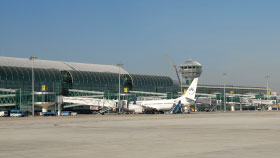
The 2010 ACI EUROPE Best Airport Awards, held in Milan in June, saw the introduction of a new Eco-Innovation Award; Izmir Adnan Menderes International Airport was joint winner, alongside Stockholm Arlanda Airport, in recognition of its environmental efforts.
TAV Airports has defined concrete criteria for potential investments. These include: capital expenditure, partnership, location and market conjuncture, scope/type of project, resource availability and value added to TAV Airports.
Sener described the TAV Airports organisational structure as unique; it incorporates the entire spectrum of airport operations, such as ground handling, operations and maintenance (O&M) services, airport retail, catering, information technology services and security. It is a diversified, but integrated model, which Sener said effectively offers a “one-stop shopping” solution for airports. While still outsourcing activities – such as retail and ground handling – to companies for which that is their core business, TAV Airports at the same time becomes a partner in those joint companies. “TAV will always be a candidate for acquiring service companies. We joined with Turkish Airlines to acquire 50% of a ground handling company. We will undertake mergers and acquisitions for growth also in service sectors,” said Sener.
Environmentally Responsible
Turkish Airlines – synergies with TAV Airports
Istanbul Atatürk is Turkish Airlines’ main hub, from where 85% of its flights depart. As a result of the global crisis, the airline suffered a 30% decline in revenue from ticket sales during the first few months of 2009 – consistent with other carriers in Turkey. The recovery began in Q4 2009 and the airline has now seen a return to pre-crisis levels.
The airline currently operates to 127 international destinations and aims increase that to 134 by the end of the year, with the introduction of services from Istanbul Atatürk to Washington DC, Ho Chi Min City, Accra, Bologna, Dar Es Salaam, Basra and Novosibirsk. Los Angeles will also be added in March 2011. These new routes will see the airline carry 31 million passengers in 2010, with 5,000 weekly flights operated by the end of the year. The airline intends to develop as much as capacity at Istanbul Atatürk will allow and has plans to grow to 10,000 weekly flights. Turkish Airlines CEO Temel Kotil has described TAV Airports quality of service as a very significant factor both in the growth process of Turkish Airlines and the aviation sector in Turkey.
TAV Airports’ environmental commitment is in keeping with its dynamism in other aspects of the airport business. TAV Izmir was the second European airport to become certified under Airport Carbon Accreditation. In recent months, both Istanbul Atatürk and Ankara Esenboga airports have also become Airport Carbon Accredited. “We are aware of our social responsibilities; we attach great importance to environmental issues. We are doing a lot of work to reduce emissions and are demonstrating this to passengers, as sustainable growth is very important,” said Sener. “Ankara and Istanbul Atatürk airports are generating their own energy through natural gas. We are also now moving to solar energy at Istanbul Atatürk and Izmir, and are planning to use electric vehicles for ground handling services.”
A cogeneration project at Ankara Esenboga allows the airport to produce its own electricity. Generating electricity from natural gas has reduced energy costs by 25% by using recaptured heat in terminal air conditioning. Meanwhile, having acquired a ‘Self-Producer License’ from the Energy Market Regulatory Authority (EPDK), TAV Istanbul is producing Ataturk Airport’s energy by generating electricity with a Trigeneration System. While generating electricity with this project, the heat recaptured will be used for terminal air-conditioning. These measures, similarly, provide around a 25% saving in energy costs.
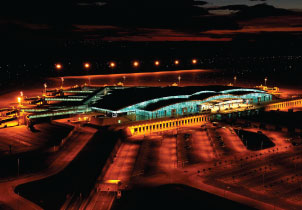
The new Enfidha International Airport opened in October 2009 and will be operated by TAV Tunisie until May 2047, predominantly serving tourism traffic.
In another innovative project, 100,000 trees have been planted in the TAV forest in Izmir and another 1,100 trees in the landscape area around the terminal. The 2010 ACI EUROPE Best Airport Awards, held in Milan in June, saw the introduction of a new Eco-Innovation Award; Izmir Adnan Menderes International Airport was joint winner, alongside Stockholm Arlanda Airport, in recognition of its environmental efforts.
New Investment Strategies
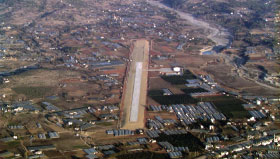
TAV Airports opened the new low-cost airport Antalya Gazipasa last June. It won the bid to operate the airport in August 2007 and it has been leased to TAV Airports for 25 years. The airport is located in an important tourist region.
TAV Airports has a strong presence in Europe, the Caucasus region, Africa and the Middle East, and ambitious growth plans. While there remain some opportunities in Turkey, it has effectively outgrown the Turkish market. It believes that operating outside Turkey in many different markets and regulatory regimes, will improve its skills and competencies as an operator. There are also plans for its service subsidiaries to expand to provide services at non-TAV airports. In line with the company’s vision and new investment strategies, TAV Airports plans to further expand its presence in Europe, the CIS (including Russia), the Middle East, Africa and India, with an emphasis on obtaining management contracts and/or operations in the Middle East and strengthening its presence in Europe.
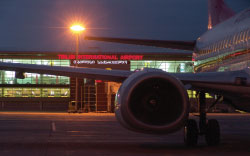
In Georgia, TAV Airports operates Tbilisi (pictured) and Batumi International airports, while it has also expanded into the Balkans via Macedonia, where it operates Skopje and Ohrid airports.
TAV Airports’ strategic vision, its rapid response to opportunities in emerging markets and its diverse investments clearly set it apart from the crowd. The recently launched ACI EUROPE report The Ownership of Europe’s Airports shows us that Europe has plenty of dynamic airport companies pursuing ambitious visions of the airport business. However, few of them can boast the kind of exceptional growth that TAV Airports has seen in its first 10 years. From our meeting with its extraordinary CEO, it looks like the next 10 years will be just as interesting.







